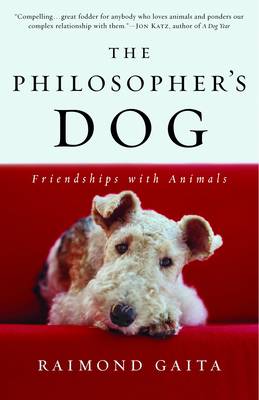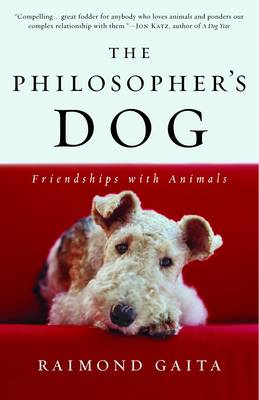
- Retrait gratuit dans votre magasin Club
- 7.000.000 titres dans notre catalogue
- Payer en toute sécurité
- Toujours un magasin près de chez vous
- Retrait gratuit dans votre magasin Club
- 7.000.0000 titres dans notre catalogue
- Payer en toute sécurité
- Toujours un magasin près de chez vous
The Philosopher's Dog
The Philosopher's Dog: Friendships with Animals
Raimond Gaita
Livre broché | Anglais
32,95 €
+ 65 points
Format
Description
The philosopher Raimond Gaita has always been fascinated by animals- their obvious intelligence and disturbing brutality, their uncanny responsiveness to our moods and needs, the deep feelings they elicit from us and seem to return. In this marvelous, luminous book, Gaita trains the lens of philosophy on the mystery and beauty of the animals he has known and loved best. The Philosopher's Dog is one of those rare works that engage the heart from the very first paragraph and haunt the mind long after one has finished reading. What does Gaita's dog, Gypsy, think about while she sits on her mat gazing out to sea for hours on end? Why did the irascible cockatoo Jack greet Gaita's father with kisses each morning but bite everyone else? How can we acknowledge that animals are sentient and yet deny that they have consciousness? Is it possible to love animals and still eat meat? In contemplating questions like these, Gaita weaves together personal stories-inspiring, sometimes heartbreaking accounts about the animals he and his family members have sheltered-with the reflections and analysis of a professional philosopher. A graceful, engaging stylist, Gaita is perfectly lucid as he grapples with great thinkers through the ages-from Socrates to Wittgenstein, Descartes to Hannah Arendt. And yet, as important as formal philosophy has been to him, Gaita frankly acknowledges that he has learned much about the nature of life from Gypsy and Jack and his courageously arrogant cat Tosca. In the end, he argues that love should be the essence of our bond with animals, the critical factor that guides how we treat them and think about their place in our world. In pondering the meaning and morality of his relationships with animals, and with the natural world more generally, Raimond Gaita has created a surprising masterpiece, a book of startling insights, spellbinding stories, meticulous observations, and wise reflection. At once engrossing and thought-provoking, The Philosopher's Dog is a supremely enjoyable book.
Spécifications
Parties prenantes
- Auteur(s) :
- Editeur:
Contenu
- Nombre de pages :
- 240
- Langue:
- Anglais
Caractéristiques
- EAN:
- 9780812970241
- Date de parution :
- 12-07-05
- Format:
- Livre broché
- Format numérique:
- Trade paperback (VS)
- Dimensions :
- 135 mm x 203 mm
- Poids :
- 176 g

Les avis
Nous publions uniquement les avis qui respectent les conditions requises. Consultez nos conditions pour les avis.






